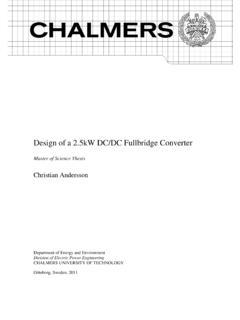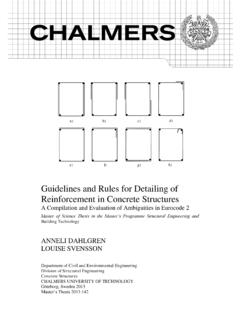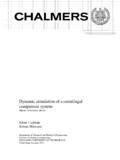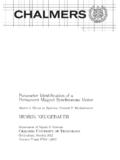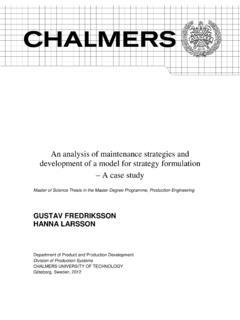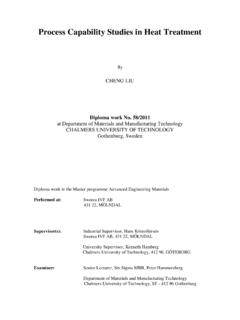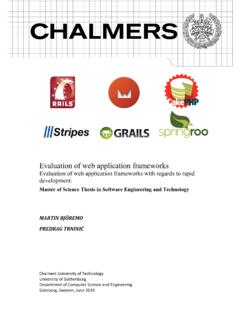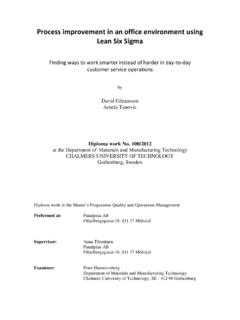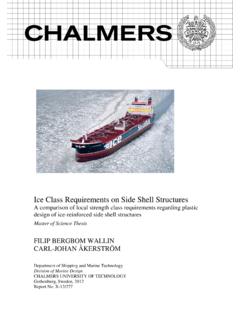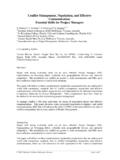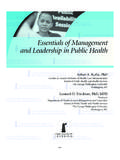Transcription of Conflict Management
1 Conflict Management How to manage functional conflicts within project teams Master of Science Thesis in the Master s Programme International Project Management MARTIN KINNANDER Department of Civil and Environmental Engineering Construction Management CHALMERS UNIVERSITY OF TECHNOLOGY Department of the Built Environment Project Management NORTHUMBRIA UNIVERSITY Gothenburg, Sweden 2011 Master s Thesis 2011:107 MASTER S THESIS 2011:107 Conflict Management How to manage functional conflicts within project teams Martin Kinnander CHALMERS UNIVERSITY OF TECHNOLOGY DEPARTMENT OF CIVIL AND ENVIRONMENTAL ENGINEERING UNIVERSITY OF NORTHUMBRIA AT NEWCASTLE SCHOOL OF THE BUILT AND NATURAL ENVIRONMENT Conflict Management How to manage functional conflicts within project teams Master of Science Thesis in the Master s Programme International Project Management MARTIN KINNANDER, 2011 Department of Civil and Environmental Engineering Construction Management Chalmers University of Technology SE-412 96 Gothenburg Sweden Tel.
2 + 46 (0)31-772 1000 Department of the Built Environment Project Management NORTHUMBRIA UNIVERSITY Newcastle City Campus Ellison Place Newcastle upon Tyne, NE1 8ST UK Telephone: +44 (0)191 232 6002 ACKNOWLEDGEMENTS I would like to thank my supervisor Dr. Max Rapp Ricciardi for his guidance and for many interesting lectures during my time at Chalmers University of Technology. I would also like to thank Dr. Allan Osborne because he led me into a sufficiently narrow range that made this study fair and workable. Many thanks also to those whom I had the opportunity to interview and for their commitment and sharing of experiences that enriched this study.
3 ABSTRACT The role as a project manager comes with dealing with all kinds of conflicts with different level of emotional involvement. Since so much time is spent on resolving these issues, being able to resolve Conflict efficient becomes essential for the project manager. Time, cost and quality are three major measures of value for a project, if conflicts can be managed professionally and effectively during the project process it will have a positive effect on these measures of value. How one approach a Conflict is very individual, conflicts where emotions play a big role are the ones that really can threaten the project and the relationships between project team members.
4 This thesis focuses on investigating different kinds of approaches and methods when dealing with conflicts . One area that has been highlighted is methods that can prevent conflicts and develop the behaviours of team members. Through methods like feedback, each individual can develop and get a chance to get to know themselves and their behaviours. The project manager should ensure that emotional charged issues don t evolve to a Conflict which could develop and become dysfunctional. In order to resolve a Conflict a Conflict competent project manager should be able to see the Conflict from an independent perspective Through this study it has been revealed that Conflict Management can be divided into two areas, prevention of conflicts and Management of functional conflicts .
5 Keywords: Conflict , Management , Project, Team TABLE OF CONTENTS 1 INTRODUCTION 1 Purpose 1 Objectives 2 Background 2 Limitations 3 2 THEORETICAL FRAMEWORK 4 Conflict Forms 4 Approaches 5 Team Configurations 8 Task Interdependence 9 Self-efficacy 9 Conflict Culture 10 Conflict Escalation 11 The Dynamic Conflict Model 11 Hot buttons 12 The retaliatory cycle 12 Intensity levels 13 Conflict Resolution 15 Organizational Justice 15 The Role of Emotions 16 Conflict Dynamics Profile 17 Perspective Taking 18 Logical Argument Mapping (LAM) 18 Vaaland s improvement model 21 Active Conflict Management 22 Negotiation 22 Summary 26 3 METHODOLOGY 27 Type of Dissertation 27 Type of Research 27 Research procedure 28 Methods 28 Literature Review 28 Interviews 28 Data Sources 29 Reliability 29 Limitations 30 How is the data organized and analyzed?
6 30 Ethics 31 4 RESULTS 32 Interviews 32 Dealing with Conflict 32 Triggers 33 Decision making processes 35 Feedback 36 Logical Argument Mapping (LAM) 37 Openness at the workplace 38 Negotiation 40 Conflict Management skills 41 Summary 42 5 DISCUSSION 44 6 CONCLUSION 47 Further research 48 REFERENCES 49 APPENDICES 52 Appendix A - Interview Questions 52 TABLE OF FIGURES Figure 1, Dynamic Conflict Model (Runde and Flanagan, 2007) 11 Figure 2, The Retaliatory Cycle (Runde and Flanagan, 2007) 12 Figure 3, Conflict Intensity levels (Runde and Flanagan, 2007) 13 Figure 4, Collateral knowledge (Hoffmann, 2005, ) 19 Figure 5, Key stages of the negotiation analysis approach, Murtoaro et al.
7 (2007) 25 Figure 6, Methodology Structure 27 CHALMERS, Civil and Environmental Engineering, Master Thesis 2011:107 1 1 Introduction Purpose The purpose with this thesis is to compare and link theoretical models and hypotheses with qualitative research that together will build up a strategic proposal for how to approach and manage a Conflict before it develops into a dysfunctional issue. The reason why Conflict Management should be investigated further and developed for effective usage is because the people within the project are the ones that make it possible to reach the objectives; they are the key to project success.
8 Therefore knowing how to successfully unite the team towards a common objective is one of the most essential skills for a project manager to hold. Further the study aims to be part of the author s own growth within the project Management area when it comes to leadership, communicative skills and the ability to foresee and manage conflicts . Finally this thesis aims to contribute with further knowledge of how to effectively manage functional conflicts and to inspire others to do supplementary research and case studies within this area. Research questions: 1) What triggers Conflict and how does conflicts evolve?
9 2) Explore different Conflict Management approaches. 3) Identify and evaluate different tools and behaviours for how to manage and resolve conflicts within project teams. CHALMERS, Civil and Environmental Engineering, Master Thesis 2011:107 2 Objectives The objective with the research made in this dissertation is to explore the Conflict Management area further. Many project managers in different organisations are spending a lot of time on managing conflicts , time that could have been spent on adding value to the company. Developing an approach to conflicts that makes the solving process more efficient gives the project manager and the project team a bigger possibility to meet the project requirements.
10 This report will also benefit the author in the means of new knowledge within Conflict Management , both on a professional level and in ordinary life. Background A project team is often defined as two or more people with some shared purpose who assume different responsibilities, depend on each other, coordinate their activities, and see themselves as part of the group according to Boddy (2002, ). Project teams tend to include individuals with different background which means that more knowledge from various fields can be added to the project. Furthermore it inevitably comes with the team members having different perspectives on tasks leading to possible conflicts .

